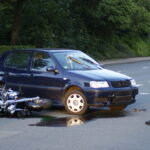The most important thing not to do is to talk to the defendant’s insurance company, and especially don’t give a recorded statement. You may be pressured to do so, but there’s very little good that can come about from this.
The insurance company may say things like “Unless you give this recorded statement we’re not going to get your car fixed. We’re not going to pay for your medical expenses. We’re going to deem you non-cooperative.”
None of that is true. You can still get your car fixed. You could still get your medical bills paid for. You can still have a great case without giving a recorded statement to a defendant’s insurance company.
These recorded statements can really damage a case because what the insurance company or the adjuster tries to do is to get the injured person to admit that they’re not injured. Or to admit that they’re going to recover really quickly, or that maybe it was even their fault. And they often do it using deceptive practices.
You should also be very careful about what you tell police officers at the scene.
If you say, “I’m fine. Don’t worry about me,” that goes in his report. Then when you find out you have a herniated disk, but the officer’s report shows that you said you were fine, it can severely damage your case.
If you think you may have said something wrong to a police officer, it may too late to fix it. For example, you told the officer “Maybe I ran the red light.” Now you want to call the officer and say you didn’t run the light.
What will happen is that the officer will put in his report, “First they said they ran the red light. Now they said they didn’t run the red light.” That may or may not help your case. It depends on the individual circumstances.
If it’s really close in proximity to the time you made the statement it should be OK to go back to the officer. After everyone’s left the accident scene, it gets a lot more difficult.
Your lawyer’s advice should be sought here. Sometimes it may be smart to contact the police officer and say, “Listen, you got it wrong here.” Or “I made an incorrect statement,” and see if you can get that resolved or fixed. Other times it just digs the hole deeper than what you’ve already dug.
Other times we just have to try to minimize the effects of an improper statement through other means. Maybe clarifying it in discovery. Or maybe sometimes even at the time of trial, we can show proper context for the statement that may have been taken out of context by a police officer.
Incorrect statements happen. People, especially at accident scenes have heightened emotions. Some of them may have been hit in the head. They may be confused. Their memories may be faulty.
Lots of times we are dealing with a situation where there’s an incorrect statement in the police report and we have our ways as attorneys of dealing with that type of evidence, minimizing or changing it.
But I would say the most important thing to do if you think you’ve made an incorrect statement to a police officer, is to contact the lawyer and discuss the correct way to rectify that situation.
We discussed how important witnesses are in the section above. So just to emphasize that, let’s say it another way…
Another thing not to do is to fail to get contact information from witnesses if at all possible. It’s very hard to find witnesses after they leave the scene







